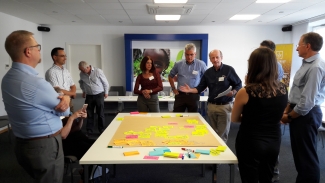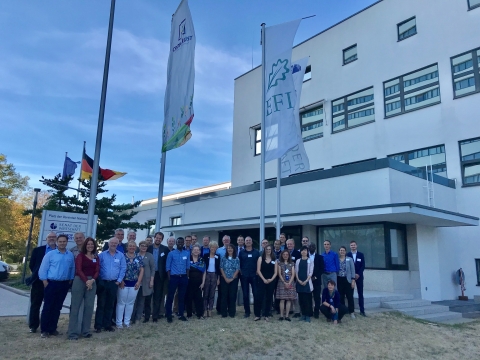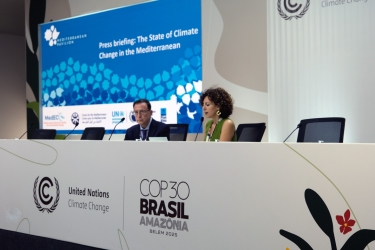Discussing the Future of Global Forest Governance

Forests are key in achieving a sustainable future as they interlink with almost all Sustainable Development Goals (SDGs). Yet, it remains increasingly challenging to govern the world’s forests with respect to global trends such as climate change, population growth and the shift towards a multipolar world order. Against this background, EFI Bonn organized a high-level science-policy workshop on 11-12 September 2018 as part of the project New frontier in global forest GOvernance – from lessons learnt to FUture options (FuGo) funded by the German Federal Ministry of Food and Agriculture (BMEL). High-level practitioners from international and non-governmental organisations, public administration and researchers from different universities and international research centres discussed possible pathways and suitable action points for the future of global forest governance.
The workshop was the third step of a Delphi assessment on the same topic that EFI Bonn (Anna Begemann, Georg Winkel, Lukas Gießen, Jeanne Roux, Dennis Roitsch) is currently conducting in the context of the FuGo project. It began with a keynote talk from Eva Müller (Director, Forestry Policy and Resources Division, FAO) on the state of the world’s forests to set the scene. The project team then presented the results of the second assessment round of the Delphi study. Delphi is a forecast assessment method that works with a panel of experts jointly going through several assessment rounds. In this case a three stage approach was selected: 1. Expert interviews, 2. Online Questionnaire, 3. Workshop. All 35 international experts, among them high-level representatives from ITTO, FAO, UNFF, WRI and other organizations and many leading scientists were interviewed. Afterwards, the expert group evaluated the condensed anonymized results of the interviews in an online survey.
Subsequently, the workshop brought together the expert panel to elaborate on future pathways and suitable action points for global forest governance based on the findings of the first two rounds. In group and plenary sessions structured by three distinct but possibly complimentary narratives on global forest governance (state-driven, market-based, participatory) the experts shared their experiences, lessons learned and ideas for the future. The discussions showed different visions for the future of global forest governance. These relate for instance to the interplay between governmental, private sector and civil society actors. Elements discussed encompassed the impact of digitalisation and big data on global forest governance, the importance of a functioning regulatory framework, and the necessity to differentiate between different types of markets (formal, informal). It was emphasized that more cooperation and coordination between initiatives, sectors and governance levels is needed to decrease fragmentation and competition among actors and initiatives in the future.
The results of the workshop will be presented together with the findings of the first (expert interviews) and second assessment rounds (online survey) in a multi-author paper later this year. Many experts expressed their wish to continue the innovative dialogue that the project enabled also on a regional level across the globe. Until the end of the year, the project team is planning dissemination events in Brussels and Germany. With that the project also aims to better connect two major worlds of global forest governance: policy (practice) and research. The Bonn workshop has been an important step into that direction.
Public Panel discussion “The Future of Global Forest Governance” with zef/Uni Bonn and UNU
In connection with the workshop on the future of global forest governance, EFI Bonn organized a public panel discussion on the same topic together with the Center for Development Research (zef) of the University of Bonn (Jan Börner, moderator of the event) and the United Nations University (UNU, Jakob Rhyner) on September 12th in the premises of zef. Five experts that had taken part in the prior workshop acted as panellists: Jussi Viitanen (EFI FLEGT/REDD+ Facilities), Matthias Schwoerer (German Federal Ministry for Food and Agriculture, BMEL), Saskia Ozinga (Fern), Gerhard Dieterle (ITTO), Constance McDermott (Oxford University) and Paolo Cerutti (CIFOR). Students and staff from different international and national forest/environmental organisations contributed to lively discussions in the plenary. The panel discussion was live streamed, recorded and is available here.
Expert interviews on global forest governance
Today’s youth will be tomorrow’s forest governance leaders. In the course of the workshop, selected participants (Gerhard Dieterle/ITTO, Jan McAlpine/formerly UNFF, Chris Beeko/Ghana Forestry Commission, David Humphreys/The Open University, Claudia Azevedo-Ramos/NAEA Federal University of Pará) shared their view on the role that the youth can play in shaping global forest governance already today. Please see our developing stream on EFI's Youtube channel.



